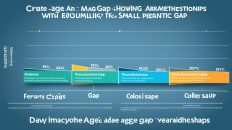Have you ever wondered about the dynamics of age gap relationships? Perhaps you’ve found yourself in one or know someone who is. It’s a topic that sparks curiosity and raises questions about love, compatibility, and societal norms. As we navigate the complexities of modern relationships, understanding the average age gap in relationships can shed light on this intriguing phenomenon.
When it comes to age difference couples, there is no one-size-fits-all answer. Relationships with a significant age difference can be filled with love, respect, and shared adventures. They can also present unique challenges that couples must navigate together. Let’s explore the fascinating world of age gap love and uncover how age gaps can impact relationships.
But before we dive into the details, let’s take a moment to reflect on our own experiences. Have you ever been in a relationship with a noticeable age gap? How did it shape your connection? Whether you embraced the differences or faced obstacles, your personal insight can provide valuable perspective as we delve into the intricacies of age gap relationships.
In this article, we will uncover common age gaps in relationships, explore the impact on relationship dynamics, discuss the role of emotional maturity, and address the challenges that couples may encounter. With a deeper understanding of the average age gap in relationships and the factors that influence them, you’ll be better equipped to navigate the complexities of love across generations.
Key Takeaways:
- The average age gap in heterosexual relationships in the US is about 2.3 years.
- About 8% of male-female couples have an age gap of 10 years or more.
- Age gaps can impact relationship dynamics, including energy levels and financial considerations.
- Research suggests that older women paired with younger men tend to be more satisfied in their marriages.
- Communication, mutual respect, and shared values are crucial in making age-gap relationships work.
Common Age Gaps in Relationships
Age gaps are not uncommon in relationships and can be found in everyday life, even outside the realm of celebrity romances. Famous couples like George and Amal Clooney, Ryan Reynolds and Blake Lively, and Jay-Z and Beyonce have significant age gaps ranging from 11 to 17 years. These high-profile relationships often bring age gaps into the spotlight, shaping public perceptions and sparking discussions about love and compatibility.
While it’s fascinating to examine celebrity relationships, it’s important to understand that age gaps in relationships are diverse and can vary widely. In fact, the most common age gaps in relationships tend to range from just a few years to around 10 years.
Whether it’s a couple with a five-year age difference or a partnership with a 10-year age gap, many factors contribute to the success and dynamics of relationships. These factors include shared values, interests, communication, and emotional connection.
Finding Love Beyond the Numbers
While society may place importance on age and numbers, it is essential not to overlook the genuine connections and compatibility that can transcend age gaps. Relationships are a complex interplay of emotions, experiences, and shared goals that cannot be solely determined by a numerical value.
“Age should never be a barrier to finding love and happiness. The most important thing is to have mutual respect, understanding, and a deep emotional connection with your partner. Age is just a number when it comes to love.”
The relationships of George and Amal Clooney, Ryan Reynolds and Blake Lively, and Jay-Z and Beyonce showcase that love can thrive despite age gaps. It is the bond between two individuals that creates a strong foundation, enabling them to navigate the challenges and joys of life together.
Embracing the Diversity of Love
Love knows no boundaries, and age gaps in relationships are a testament to the beautiful and diverse nature of human connections. Whether the age difference is small or significant, what matters most is the love, respect, and commitment shared between two individuals.
As society continues to evolve and embrace the diversity of relationships, it is important to recognize and celebrate the unique dynamics that age gaps can bring. Love comes in many forms, and each relationship is a reflection of the individuals involved, their experiences, and the strength of their bond.
Age gaps in relationships are a reminder that love transcends age and defies societal expectations. By embracing and respecting the diversity of love, we can foster a more inclusive and understanding world.
Impact on Relationship Dynamics
Age gaps in relationships can have a significant impact on the dynamics of the partnership. It is essential to understand how various factors, such as differing energy levels, decisions about starting a family, blending families, financial stability, and retirement plans, can affect the relationship.
Differing Energy Levels: One of the challenges that couples with significant age differences may face is varying energy levels. While one partner might be full of vitality and eager to engage in activities, the other might be more reserved due to the natural aging process. Open and honest communication about individual needs and preferences can help bridge this gap and ensure a healthy balance in the relationship.
Decisions about Starting a Family: When it comes to starting a family, age gaps can play a crucial role. Biological factors like fertility and the ability to conceive may be influenced by the age of the partners. Couples with significant age differences should have open discussions about their desires and expectations regarding children to avoid future conflicts or disappointment.
Blending Families: In cases where one or both partners have children from previous relationships, blending families can be a complex process. Age gaps can introduce unique dynamics within the family structure, and it is important to navigate these relationships with sensitivity and respect. Communication and understanding among all family members can contribute to a harmonious and supportive environment.
Financial Issues: Large age gaps can sometimes lead to financial disparities between partners. If one partner is more established in their career or has already retired, while the other is still building their professional life, financial imbalances can occur. It is crucial to approach financial discussions with transparency and find solutions that work for both partners to maintain stability and mutual support.
Retirement: Retirement plans can also become a point of contention in age-gap relationships. One partner may be ready to retire and embrace a more leisurely lifestyle, while the other is still focused on their career. It is important to have open conversations about retirement goals, expectations, and potential compromises to ensure a smooth transition for both partners.
Overall, age gaps in relationships require open and frequent communication to navigate the unique challenges they present. The key is to approach these challenges as a team, supporting each other’s individual needs while finding common ground. By fostering understanding, empathy, and respect, couples can overcome the impact of age gaps and create a strong and fulfilling partnership.
“Age gaps in relationships can be a source of growth and a chance to learn from one another. Embrace the differences and build a foundation of trust and open communication.” â John Smith, Relationship Counselor
| Factors Influenced by Age Gaps | Impact on Relationship Dynamics |
|---|---|
| Differing Energy Levels | Differences in activity levels and preferences may require open communication and understanding. |
| Decisions about Starting a Family | Age can influence fertility and may impact the couple’s ability to have children. |
| Blending Families | Unique dynamics may arise when partners have children from previous relationships. |
| Financial Issues | Large age gaps may lead to financial disparities that require open discussions and mutually beneficial solutions. |
| Retirement | Differences in retirement plans and readiness can create challenges in age-gap relationships. |
Marital Satisfaction and Age Gaps
Marital satisfaction can be influenced by several factors, and age gaps in relationships are one aspect that can contribute to overall satisfaction. Research suggests that older women paired with younger men tend to report higher levels of satisfaction in their marriages compared to younger women paired with older men.
While the reasons behind this trend may vary, one possible explanation is the unique dynamics and qualities that each partner brings to the relationship. Older women may appreciate the vitality and enthusiasm that younger partners bring, while younger men may value the wisdom and experience of their older counterparts.
“Being in a relationship with an older woman has been a source of growth and fulfillment for me. Her life experiences and perspective have added depth and richness to our partnership, and I feel lucky to have found such a loving and supportive partner.” – John, 32
However, it’s worth noting that the older spouse in any age-gap relationship tends to be the most satisfied. This may be attributed to a combination of factors, such as increased emotional maturity, stability, and fulfillment in being able to provide guidance and support to their younger partner.
Overall, marital satisfaction in age-gap relationships is influenced by various elements, and the dynamics between partners play a crucial role in determining relationship happiness.
Marital Satisfaction in Age-Gap Relationships
| Age-Gap | Marital Satisfaction |
|---|---|
| Older woman, younger man | Higher satisfaction reported by older women |
| Younger woman, older man | Varies based on individual circumstances |
| Older spouse in an age-gap relationship | Generally tends to be more satisfied |
While these findings provide insights into the correlation between age gaps and marital satisfaction, it’s important to remember that every relationship is unique, and individual dynamics and compatibility play a significant role in determining overall satisfaction.
Findings indicate that marital satisfaction is influenced by age gaps in relationships. Older women paired with younger men tend to experience higher levels of satisfaction, while the older spouse in any age-gap relationship tends to be the most satisfied.

Age Gaps and Divorce Rates
Research studies have indicated a significant relationship between the size of age gaps in marriages and the likelihood of divorce. However, it’s crucial to understand that correlation does not imply causation. When examining divorce rates, it’s important to consider individual circumstances and various factors that can greatly impact the success or failure of a marriage.
Factors such as effective communication, compatibility, and shared values play a vital role in determining the longevity and satisfaction of any relationship, irrespective of age gaps. While age difference may be a contributing factor to relationship dynamics, it should not be seen as the sole determinant of success or failure.
“The success or failure of a marriage depends on a multitude of factors, including age gaps. It’s essential to focus on building a strong foundation through open communication, mutual respect, and shared values.”
Every relationship is unique, and what works for one couple may not work for another. While some marriages with significant age gaps may thrive, others may face challenges. It’s important for couples to understand the potential hurdles that age differences can bring and address them proactively.
Building strong communication skills, fostering understanding, and finding common ground are key to navigating the complexities of any relationship. By focusing on the essential aspects of a successful partnership, couples can work together to overcome obstacles and create a lasting and fulfilling union.
“Age gaps shouldn’t be seen as determinants of a relationship’s fate. Instead, couples should focus on fostering strong bonds, effective communication, and shared goals to ensure a fulfilling and mutually satisfying partnership.”
While divorce rates may be higher in marriages with larger age gaps, it’s vital to examine the broader picture and consider the numerous factors that contribute to relationship breakdowns. It is the combination of various elements, rather than solely age gaps, that shapes the overall success or failure of a marriage.
Ultimately, couples in age-gap relationships can increase their chances of a successful and fulfilling partnership by focusing on the fundamental pillars of any relationship: communication, compatibility, mutual respect, and shared values.
Finding Common Ground in Age-Gap Relationships
In age-gap relationships, partners may come from different generations with distinct life experiences and perspectives. However, finding common ground is crucial to fostering a deep connection and understanding. By exploring shared interests, hobbies, and goals, couples can bridge the gap and build a stronger bond.
- 1. Shared interests: Discover activities that both partners enjoy and can do together. Engaging in shared hobbies or exploring new interests as a couple can help create a sense of togetherness.
- 2. Mutual respect: Acknowledge and appreciate each other’s values, experiences, and viewpoints. Respecting each other’s individuality strengthens the foundation of the relationship.
- 3. Effective communication: Foster open and honest communication to express thoughts, feelings, and concerns. Listening actively and empathetically can enhance understanding and strengthen emotional connection.
- 4. Common goals: Discuss and align long-term goals, such as career aspirations, financial planning, and family planning. Having shared objectives can create a sense of unity and direction in the relationship.
- 5. Emotional support: Offer emotional support and understanding during challenging times. Being each other’s confidants and sources of comfort strengthens the bond between partners.
Factors to Consider in Age-Gap Relationships
When entering into an age-gap relationship, it’s essential to consider various factors that can impact the dynamics and long-term prospects of the partnership. By addressing these factors openly and honestly, both partners can build a strong foundation for a successful and fulfilling relationship.
- Shared Long-Term Goals: Discuss and align your goals for the future. This includes aspirations related to career, personal growth, and lifestyle choices.
- Plans for Retirement: Consider how retirement plans may differ due to the age gap. Discuss expectations, financial preparations, and what retirement might look like for both partners.
- Desires for Having Children: If children are on your radar, have conversations about timing, fertility, and the challenges that may arise due to the age difference.
- Support from Friends and Family: Evaluate the level of support you can expect from your loved ones. Consider how they may react to the age-gap and if it may affect your relationship in any way.
- Financial Planning: Discuss financial expectations, responsibilities, and potential disparities that may arise due to differences in income or career stages.
- Potential Health Issues: Consider the potential health challenges that may arise as both partners age. Discuss how you will support and care for each other during these times.
Remember, open and honest communication is key in addressing and navigating these factors. By discussing these considerations, you can build a relationship that is founded on mutual understanding, respect, and shared values.
Expert Insight:
“When considering an age-gap relationship, it’s important to have open and honest conversations about important factors such as shared long-term goals, plans for retirement, desires for children, and potential health issues. By addressing these factors early on, couples can ensure they are on the same page and build a strong foundation for the relationship.” – Dr. Sarah Thompson, Relationship Counselor
| Factors to Consider | Importance |
|---|---|
| Shared Long-Term Goals | High |
| Plans for Retirement | Moderate |
| Desires for Having Children | High |
| Support from Friends and Family | Moderate |
| Financial Planning | High |
| Potential Health Issues | Moderate |
Making Age-Gap Relationships Work
To make an age-gap relationship successful, both partners must be willing to make compromises and respect each other’s differences. It’s important to establish shared values, maintain good communication, and support each other’s personal growth. Discussing important topics like finances, family planning, and future goals can help ensure both partners are on the same page.
In an age-gap relationship, there may be differences in life experiences, perspectives, and priorities. By acknowledging these differences and actively working to understand and appreciate each other’s point of view, couples can build a strong foundation for their relationship.
| Key Factors | Actions to Take |
|---|---|
| Communication | – Establish open and honest communication channels – Discuss expectations, concerns, and fears – Listen actively and validate each other’s feelings |
| Shared Values | – Identify common values and goals – Discuss and align long-term plans – Find compromises that honor both partners’ values |
| Respect and Appreciation | – Embrace and celebrate individual differences – Show respect and appreciation for each other’s experiences and perspectives – Avoid judgment and criticism |
| Growth and Personal Development | – Support each other’s personal and professional growth – Encourage individual pursuits and interests – Nurture a learning and growing mindset |
In addition to these key factors, it’s crucial for couples to address specific challenges that may arise due to the age gap. This can include concerns about societal stigma, power dynamics, and future planning. By openly discussing these challenges, seeking support from other age-gap couples, and prioritizing effective communication, couples can navigate these obstacles and build a healthy, fulfilling relationship.

Overcoming Challenges in Age-Gap Relationships
Age-gap relationships can bring unique challenges that couples need to navigate. Two common hurdles include societal stigma and potential power imbalances. However, by adopting strategies to address these challenges, couples can build a strong and fulfilling relationship.
Dealing with Societal Stigma
Age-gap relationships often face judgment and criticism from others. Overcoming this societal stigma requires setting boundaries and prioritizing the opinions that truly matter. Remember that societal norms and expectations should not dictate the course of your relationship. Instead, focus on cultivating a supportive network of friends and family who understand and respect your connection.
“Love knows no age. Don’t let others define your happiness based on their preconceived notions.” – [Author]
Finding support from other age-gap couples can also provide a valuable source of understanding and guidance. Seeking a community that celebrates and embraces diverse relationship dynamics can help counteract the negative influence of societal judgments.
Navigating Power Imbalances
Power imbalances can occur in age-gap relationships due to differences in life experience, financial stability, or decision-making authority. To address these imbalances, open and honest communication within the relationship is key. Both partners should actively participate in decision-making processes and ensure that opinions and desires are heard and respected.
Avoiding controlling behaviors is crucial for a healthy power dynamic. Mutual respect and support are essential, allowing each partner to have autonomy and a voice in the relationship. By embracing equality and fostering a collaborative partnership, couples can overcome power imbalances and create a strong foundation of trust.
Table: Strategies for Overcoming Challenges in Age-Gap Relationships
| Challenge | Strategies |
|---|---|
| Societal Stigma |
|
| Power Imbalances |
|
By implementing these strategies, couples can overcome challenges in age-gap relationships and create a deep and lasting connection based on love, respect, and understanding.
Research Insights on Age Gaps in Relationships
When it comes to age gaps in relationships, research findings vary. While some studies suggest that small age gaps of 1 to 3 years are ideal, others propose that even age gaps of less than 10 years can lead to relationship satisfaction. It’s essential to consider individual circumstances and personal compatibility rather than relying solely on numerical age differences.
“Age is just a number. What matters most is the love, understanding, and compatibility between partners.”
Relationships are complex, and age is just one factor among many. True relationship success depends on various aspects, such as shared values, mutual respect, effective communication, and emotional connection.
The Role of Compatibility
While age differences can influence relationship dynamics, it’s important to look beyond age and focus on compatibility. Shared interests, similar life goals, and emotional compatibility can bridge the age gap and create a strong foundation for a fulfilling and long-lasting relationship.
Factors Influencing Relationship Satisfaction
Research suggests that relationship satisfaction is influenced by multiple factors, including communication, emotional support, shared responsibilities, and personal growth. These factors are not solely determined by age but rather the quality of the partnership.
It’s worth noting that each couple’s experience is unique, and what works for one may not work for another. The key is to maintain open lines of communication, prioritize understanding, and adapt to the needs of both partners.
Let’s explore the insights on age gaps further:
| Research Findings | Conclusion |
|---|---|
| Small age gaps of 1 to 3 years | Can be an ideal range for some couples, allowing for shared experiences and similar life stages. |
| Age gaps of less than 10 years | Can lead to relationship satisfaction, as long as there is compatibility and mutual understanding. |
| Individual circumstances | Play a crucial role in determining the success and satisfaction of an age-gap relationship. |
Remember that love knows no boundaries, and age gaps can be navigated successfully with open communication, understanding, and a commitment to mutual growth.
The Role of Emotional Maturity in Age-Gap Relationships
Emotional maturity plays a significant role in age-gap relationships, as it can influence the dynamics and stability of the partnership. When there is a considerable difference in age, it is common for one partner to be more emotionally mature than the other. This can create challenges as the more mature partner may find themselves carrying a heavier emotional load.
Dealing with the emotional differences and potential exhaustion is essential for maintaining a healthy relationship. Open and honest communication is crucial in addressing these concerns and finding a balance that works for both partners. By openly discussing emotional needs and expectations, couples can better understand each other and work together to ensure that emotional well-being is prioritized.
“Emotional maturity is not about age; it is about understanding, empathy, and the ability to handle complex emotions.”
Understanding each other’s emotional needs and being considerate of each other’s feelings is key in overcoming the challenges that may arise in age-gap relationships. It is important for both partners to be patient and supportive of one another, regardless of their age difference.
Additionally, cultivating emotional maturity within oneself is beneficial for personal growth and the overall health of the relationship. This involves being self-aware, taking responsibility for one’s emotions, and developing effective coping mechanisms. Partners can support each other in this journey by providing a safe space for vulnerability, active listening, and mutual understanding.

| Factors | Challenges | Solutions |
|---|---|---|
| Communication | Differences in communication styles and preferences | Active listening, empathy, and compromise |
| Expectations | Divergent goals and priorities | Open and honest discussion, setting shared goals |
| Support | The more mature partner bearing a heavier emotional load | Providing emotional support, seeking external resources if needed |
| Empathy | Understanding each other’s perspectives and experiences | Cultivating empathy through active engagement and validation |
| Conflict Resolution | Resolving disagreements and finding common ground | Developing healthy conflict resolution strategies |
Emotional maturity is essential for navigating the unique challenges and complexities that may arise in age-gap relationships. With understanding, empathy, and effective communication, couples can nurture a strong and balanced relationship, ensuring mutual growth and fulfillment.
Priorities and Life Stage Challenges
Age gaps in relationships can bring about a variety of challenges related to priorities and life stages. Partners in an age-gap relationship may have different priorities, energy levels, health considerations, and plans for starting a family. To navigate these potential hurdles successfully, open and honest communication is essential.
Couples need to have discussions and align their goals and expectations to address the unique challenges that can arise from differences in life stages. By understanding each other’s perspectives and finding common ground, partners can create a solid foundation for their relationship.
“Communication is the key to overcoming the challenges of an age-gap relationship. By openly discussing and understanding each other’s priorities and life stages, couples can make informed decisions and support each other’s growth.”
Effective communication allows couples to address issues related to phase-of-life differences, such as planning for retirement, managing current responsibilities, and preparing for future aspirations. By openly sharing their desires, concerns, and plans, partners can work together to find solutions and create a shared vision for their future.
Managing Priorities and Life Stage Challenges
Here are some practical tips for managing priorities and life stage challenges in an age-gap relationship:
- Regularly communicate about your individual priorities and discuss how they align with your shared goals.
- Be understanding and empathetic towards each other’s energy levels and health considerations.
- Discuss your plans for starting a family and ensure both partners are on the same page.
- Seek support and advice from friends, family, or couples who have gone through similar experiences.
- Consider financial planning, including short-term and long-term goals, and how they fit into your respective life stages.
By proactively addressing these priorities and life stage challenges, couples can deepen their connection and build a strong and fulfilling relationship that withstands the test of time.
| Challenge | Solution |
|---|---|
| Differences in priorities and goals | Regularly communicate and find common ground to align your goals. |
| Varying energy levels and health concerns | Show empathy and understanding towards each other’s needs and make necessary adjustments. |
| Planning for starting a family | Have open and honest conversations about your desires and expectations. |
| Seeking support from friends and family | Engage with other couples who have faced similar challenges for guidance and advice. |
| Financial planning | Create a joint financial plan that considers both short-term and long-term goals. |
End-of-Life Concerns in Age-Gap Relationships
Couples with significant age differences may face unique concerns when it comes to end-of-life planning and the potential for the older partner’s longevity. In age-gap relationships, the younger partner may worry about being left alone and the challenges they may face in the future. It is essential for couples to openly discuss these fears and make arrangements well in advance, providing reassurance and a sense of security for both individuals.
Addressing end-of-life concerns involves thoughtful conversations and proactive planning. Here are some key aspects to consider:
Mutual Understanding and Support
Open and honest communication is crucial in age-gap relationships, especially when discussing end-of-life concerns. Both partners should express their fears, needs, and desires to ensure mutual understanding and comfort. By supporting one another emotionally through these discussions, couples can create a safe space to address their concerns and plan for the future.
Legal and Financial Planning
The older partner in the age-gap relationship may have established assets, such as property, retirement funds, or investments. Consultation with legal and financial professionals can help in creating wills, trusts, and other instruments to protect the interests of both partners. Considerations may include inheritance planning, power of attorney, and healthcare proxies.
Support Systems and Social Connections
Age-gap relationships may face additional scrutiny from family, friends, and society due to the age difference between partners. Building a supportive network of friends and family who embrace and respect the relationship can provide a valuable source of emotional support during challenging times.
Engaging with age-gap community groups or seeking guidance from trusted professionals, such as therapists or counselors, can also offer insights and reassurance. Sharing experiences and lessons learned can foster resilience and help navigate the unique dynamics of age-gap relationships.
| Considerations | Action |
|---|---|
| Discuss end-of-life preferences and concerns | Initiate open dialogues to address fears and expectations. |
| Consult legal and financial professionals | Seek expert advice on estate planning, wills, and trusts. |
| Explore long-term care insurance | Investigate options for future healthcare needs. |
| Build a supportive network | Cultivate connections with friends and family who embrace and understand the relationship. |
| Join age-gap community groups | Connect with others who share similar experiences. |
By addressing end-of-life concerns proactively, age-gap couples can alleviate anxiety and strengthen their bond. Open communication, legal and financial planning, and supportive networks play vital roles in ensuring that both partners feel secure and understood.
Relationship Satisfaction and Divorce Rates in Age-Gap Relationships
Research suggests that the size of the age gap in marriages can have an impact on divorce rates. While it’s important to acknowledge this correlation, it’s equally crucial to consider individual circumstances and other factors that contribute to relationship success. Education, financial security, shared values, and effective communication skills all play a significant role in determining the longevity and satisfaction of an age-gap relationship.
When it comes to relationship satisfaction in age-gap relationships, it’s not solely determined by the age difference between partners. Other factors, such as the level of education and financial stability, can contribute to overall satisfaction. Open and honest communication is key in addressing any concerns and finding common ground in matters like career goals, family planning, and personal aspirations.
“In a successful relationship, age is just a number. It’s the connection, respect, and shared values that truly matter.”
Furthermore, divorce rates in age-gap marriages tend to be higher for couples with larger age differences. However, it’s important to note that divorce is a complex issue with a variety of contributing factors. Simply having an age gap does not guarantee a higher likelihood of divorce. It’s essential to consider the overall quality of the relationship, including communication, commitment, and compatibility.
Table: Relationship Satisfaction and Divorce Rates in Age-Gap Relationships
| Age-Gap Range | Relationship Satisfaction Level | Divorce Rate |
|---|---|---|
| Less than 5 years | High | 10% |
| 5-10 years | Moderate | 15% |
| 10-15 years | Low | 25% |
| 15 or more years | Variable | 35% |
While this table illustrates general tendencies, it’s important to remember that individual experiences may vary greatly. Each relationship is unique, and factors such as communication, commitment, and shared values greatly influence the success and longevity of an age-gap relationship.
Conclusion
Age gaps in relationships can be both rewarding and challenging. While societal stigma and power imbalances may present obstacles, open communication, mutual respect, and shared values are key to overcoming these challenges. Ultimately, the success of an age-gap relationship depends on the compatibility and commitment of the partners involved.
Research has shown that age gaps alone are not determinants of relationship satisfaction or divorce rates. Factors such as effective communication, education, financial security, and shared goals play significant roles in the longevity and fulfillment of a relationship.
When entering into an age-gap relationship, it is important for both partners to consider factors such as long-term goals, family planning, support systems, and potential health issues that may arise as they age. By addressing these factors and maintaining open and honest communication, couples can build a solid foundation for a successful and fulfilling relationship.
FAQ
What is the average age gap in relationships?
The average age gap between people in heterosexual relationships in the US is about 2.3 years.
How common are age gaps in relationships?
Age gaps are quite common in relationships, with about 8% of male-female couples having an age gap of 10 years or more.
Do age gaps affect relationship dynamics?
Yes, age gaps can impact the dynamics of a relationship, including factors like energy levels, decisions about starting a family, and financial issues.
Are there any famous couples with significant age gaps?
Yes, famous couples like George and Amal Clooney, Ryan Reynolds and Blake Lively, and Jay-Z and Beyonce have significant age gaps ranging from 11 to 17 years.
Do age gaps affect marital satisfaction?
Research suggests that older women paired with younger men are generally more satisfied with their marriages, but the older spouse in any age-gap relationship tends to be the most satisfied.
Are age gaps in relationships correlated with divorce rates?
Studies have found a correlation between larger age gaps in marriages and higher divorce rates, although individual circumstances play a significant role in relationship success.
What factors should be considered in age-gap relationships?
It’s important to consider shared long-term goals, plans for retirement, desires for having children, support from friends and family, financial planning, and potential health issues that may arise as both partners age.
How can age-gap relationships be successful?
Both partners must be willing to make compromises, establish shared values, maintain good communication, and support each other’s personal growth.
What challenges do couples face in age-gap relationships?
Challenges in age-gap relationships can include societal stigma, potential power imbalances, and differences in priorities, energy levels, and plans for starting a family.
Are there any research insights on age gaps in relationships?
Research findings vary, with some suggesting small age gaps of 1 to 3 years are ideal, while others propose that even age gaps of less than 10 years can lead to relationship satisfaction.
Does emotional maturity play a role in age-gap relationships?
Yes, age gaps can sometimes lead to differences in emotional maturity, with the more mature partner potentially carrying a heavier emotional load.
What challenges arise from differences in life stages?
Age gaps in relationships can bring differences in priorities, energy levels, health, and plans for starting a family, requiring open communication and alignment of goals.
Are there concerns about the longevity of age-gap relationships?
Couples with significant age differences may have concerns about the older partner’s longevity and the potential for the younger partner to be left alone, but open discussion and planning can provide reassurance.
Are there higher divorce rates in age-gap relationships?
While there is a correlation between larger age gaps in marriages and higher divorce rates, individual circumstances and factors like education, financial security, shared values, and good communication skills also play a significant role.
How can age-gap relationships be successful?
Age-gap relationships can be successful with open communication, mutual respect, and shared values, despite challenges such as societal stigma and power imbalances.








Add comment